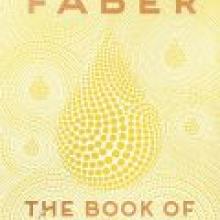
His latest novel The Book of Strange New Things, an exploration of religion and its translation through alien eyes that reminded me of Mary Doria Russell's masterpiece The Sparrow, is equally strange and unsettling.
When evangelist preacher Peter Leigh is hired to a ministry position on Oasis, humanity's first off-world colony, he imagines himself following in the footsteps of the earliest Christian missionaries.
As it turns out, his fellow employees are in no need of his services - carefully selected for their phlegmatic nature and lack of emotional ties to home, most are content to live day by day, eschewing drugs, alcohol, violence and sex - but the native Oasans have been awaiting his arrival with great anticipation.
Delighted to find a ready-made and receptive congregation, Peter quickly involves himself in their community, spending weeks at a time living among them and sharing the teachings of the Bible with a small but dedicated group of self-titled Jesus Lovers.
It is a pastoral existence centred on the basics of daily life; eating, sleeping, and the harvesting and processing of a versatile native plant into staple foodstuffs that they exchange with the colonists in return for human medicines.
Indeed the greatest challenge of Peter's ministry is purging the New Testament of the `t's and `s's that the Oasans struggle to pronounce.
The problems of Earth seem a very long way away, and were it not for the fact that his wife, Beatrice, is struggling to cope with a series of crises that leave her questioning her own belief in God, Peter would be content to remain on Oasis forever.
Instead he finds himself struggling to connect with and support his partner in life and faith.
The oratory that comes to him so easily in his sermons eludes him in his letters home, and the biblical quotations that spring to mind as he seeks to ease her distress are worse than useless.
Eventually he is forced to choose between his mission and his marriage, between a life in peaceful, time (and passion)less Oasis and a return to the delights and dangers of Earth.
Because it is told through Peter's eyes, the narrative is framed by and imbued with his Christian perspective, a technique that initially left me decidedly ambivalent, as did the overt symbolism of the setting.
As the novel progressed I decided there was scope for a more ambiguous interpretation and subtler allusions (the Lotus Eaters perhaps, or an inverted Orpheus and Euridice?).
It was not until I learnt Faber's wife was terminally ill during the writing that the full significance of Peter's feelings of separation and helplessness became clear.
The Book of Strange New Things is a profound examination of one man's psychological and emotional struggle with love, loss and God.
• Cushla McKinney is a Dunedin scientist.











